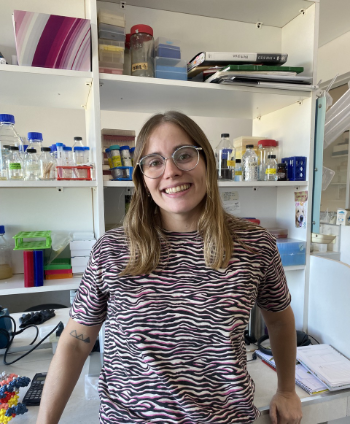Lucía Gonzalo, Ph.D.By Patricia Baldrich, Ph.D.  Lucía Gonzalo earned her bachelor's degree in Biotechnology from the Universidad Nacional del Litoral in Santa Fe, Argentina. Her senior project focused on “Functional studies of BdPAP2 and its role in the architecture of the inflorescence of Brachypodium distachyon” under the supervision of Dra. Nora Uberti Manassero in the Department of Plant Biology. Following her undergraduate studies, Lucía pursued her PhD at the Small RNA Laboratory in the Institute for Agrobiotechnology at CONICET-UNL, Argentina. There, Lucía’s thesis focused on understanding the coupling between transcription and microRNA processing in plants in the microRNA pathway in plants, under the supervision of Dr. Pablo A. Manavella. Lucía is fascinated by pre-mRNA splicing. She found herself particularly intrigued by an article from RNA Journal titled“First come, first served revisited: factors affecting the same alternative splicing event have different effects on the relative rates of intron removal” byManuel de la Mata, Celina Lafaille, and Alberto R Kornblihtt (DOI: 10.1261/rna.1993510). This article challenges the traditional view of the sequence of intron removal during the splicing process. The authors propose a "first committed" model instead of the "first come, first served" principle. To Lucía, this was “a transcendental change in this traditional view, showing evidence suggesting a preferential removal of the downstream intron before the excision of the upstream intron.” This investigation has expanded her understanding of the regulatory intricacies of alternative splicing and demonstrated the potential of assessing the order of intron removal as a tool to distinguish between different mechanisms of alternative splicing. Lucía draws from her own experiences and trials to share her advice with graduate students. She emphasizes the importance of organizational skills within the laboratory setting. “The most important thing in a lab day is organization. At first, it was useful for me to write a list at the end of the workday, detailing the experiments I needed to do the next day and planning the time for each one,” Lucía added. By following this strategic roadmap that contemplates all necessary steps and potential challenges, Lucía has developed a winning strategy. This approach allows her to be proactive rather than reactive, ensuring that each lab day is as productive as possible.
Lucía is inspired by her university professors, whose passion for their scientific projects and significant discoveries deeply influenced her. This inspiration played a part in her decision to teach Cell and Molecular Biology at Universidad Nacional del Litoral. Her role as a teacher enables her to give back to her public university, reciprocating all the support and resources received over the years, while also helping her keep her knowledge updated across all topics. “Not just my specific research area. Furthermore, it contributes to my investigation by providing me with a broader perspective” Lucía said. One of the significant challenges Lucía encountered in her career was securing a postdoctoral position. She explains, “With numerous research groups worldwide offering excellent projects, the decision to select a new research area, join a new workgroup, and potentially relocate carries significant weight and stress.” To navigate this daunting process, she meticulously explored numerous opportunities. Lucía diligently assessed various factors, including the reputation of the research group, available funding, how well the research area matched her interests, and the societal environment of the potential cities or countries. Lucía feels fortunate to have secured a three-month fellowship at Marquardt’s Lab in Copenhagen, Denmark, where she could do exciting experiments, experience a different group dynamic, and exchange ideas with new colleagues. This opportunity was made possible with the assistance of the International Union of Biochemistry and Molecular Biology. Such opportunities are often hard to come by in her home country due to the limited funding available for scientific research. Lucía hopes that by sharing her experiences, she can inspire and encourage others who may be facing the same struggles. Lucía is passionate about small RNAs, and her favorite RNA molecules are, of course, Primary micro RNAs (or Pri-miRNAs). Although she hasn't had the chance to attend an RNA Society meeting yet, she is looking forward to it and is sure it would be a valuable experience. Follow Lucía Gonzalo on Twitter (@luciigonzalo) to stay updated with her latest research insights and experiences. |
